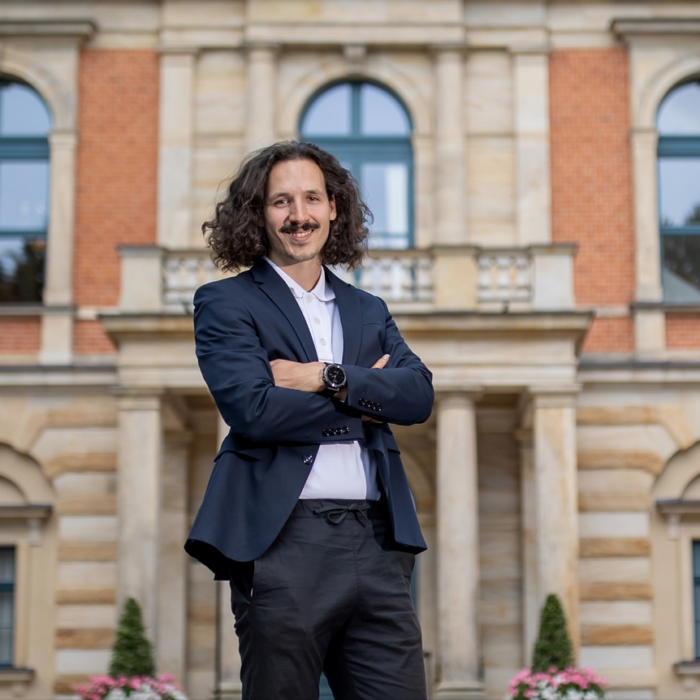
Living The Dream – Benjamin Bernheim On Singing Dream Roles & Deutsche Grammophon
By Francisco SalazarTwo years ago, Benjamin Bernheim was a young artist performing light tenor roles and preparing to make the jump to some of the most important lyric operas in the repertory. He was an unknown and was still a member of the Opernhaus Zurich.
But he had a perspective of where he wanted to be.
“I knew I wanted to sing Alfredo, Des Greiux and Rodolfo and I was preparing for all those roles at the time. I was still singing a lot of secondary roles and I was a member of the Opernhaus Zurich. When I did ‘Capuleti e Montecchi,’ I knew I was on the verge of doing these big roles. All these big plans were beginning,” he said in a recent interview with OperaWire.
Now in 2019, Benjamin Bernheim is on the verge of stardom, taking on leading roles at some of the most important houses in the world and headlining new productions. In the 2019-20 season, Bernheim will open two new productions at the Opéra National de Paris cementing his status as one of the foremost French tenors.
Paris
It will be a hectic few months for Bernheim in Paris as he takes on a new production of “La Traviata” and “Manon.” It will be the second and third new production the tenor headlines in Paris after “La Bohème,” which he will also reprise with the company.
“The funny thing is I am singing three operas in Paris and all the stories take place in Paris. I am singing ‘La Traviata,’ ‘Manon’ and ‘La Bohème.’ ‘La Traviata’ and ‘La Bohème’ will happen in the Garnier and it will be magical.”
Of course, all three of those operas are major headliners, something not lost on the tenor.
“To sing these works in Paris and in this legendary theater is important. Thankfully I have sung a lot of ‘Traviata’s’ in the past years so I am ready to take on the challenge and the pressure. It is really a big thing and the history of this work in Paris. So the important thing is to bring my personal touch to this work and to respect the tradition.”
And for both “Manon’ and “La Traviata,” Bernheim will have the benefit of working with the same soprano, Pretty Yende, who is becoming one of opera’s biggest superstars.
“I have never worked with Pretty Yende so it will be a nice experience. We will have to build our relationship first as Violetta and Alfredo and then as Des Greiux and Manon. It will be completely different and I look so forward to working with her. She’s a big star and a great pleasure to discover a new voice and a new personality.”
Verdi
Kicking off his 2019-20 season, Bernheim will sing two Verdi roles in a row. First is the aforementioned “Traviata” in Paris and then his role debut as the Duke in “Rigoletto,” an opera he has dreamed of singing for a long time. Both roles will also come after Ismaele in “Nabucco,” another role debut.
“In terms of style, there is are a lot of lines that are similar because they are both written by Verdi but all three roles are very different and something like Ismaele is very small in comparison. It is closer to Macduff than any other Verdi role I sing.”
Looking at Alfredo, Bernheim believes the role is not as tricky as the Duke. As he notes Alfredo is very much a supporting character who is there to magnify her and to support her.
“As Alfredo, there is enough material in the role to show a large panel of colors, but the responsibility of carrying the show really lies with the soprano.”
But when it comes to the Duke, it is a different story.
“The Duke is a much more demanding role and I am really looking forward to it. It’s totally different from ‘Traviata’ because it demands different agility and a plan for the night. You have to know when to give more and when to pace yourself.”
Another big difference is the range. “‘Traviata’ doesn’t go very high and the tessitura for the Duke is very high and demands more flexibility in the higher notes. In a way, singing Alfredo is good training for the Duke.”
Massenet & French
After singing the Verdi roles, Bernheim will take a break with “Manon.” He debuted the role during the 2018-19 season in Bordeaux to rave reviews and for Bernheim, it was one of the best experiences of his life.
“I didn’t want to stop singing the role and in a way, it was so sad to leave because I would have liked to have five more performances to develop all these colors,” Bernheim admitted.
“It was great because I never worked on a role that fit my voice so well in terms of all the colors I could bring. I tried to mix both the modern way of singing with the traditional French way of singing, accepting the mixed voice. It was a huge surprise to find that every phrase and every moment of the work fits so well in my voice.”
Part of the reason the role suited Bernheim so well was the way Massenet wrote the role.
“For me, it’s a very smooth beginning and it feels like you’re on a cloud and life is beautiful. It’s fantastic and at the end the three last acts are violent and you have to be 100 percent. It feels like you’re doing a completely different performance. The intensity is nonstop but yet there is tenderness like in the first act. So it is challenging but it’s quite fantastic.”
Now that he has sung the role, Bernheim hopes that it will open up opportunities to take on other repertory in his native language.
“I have sung very little French. I sang in ‘Thaïs’ but that is a small role. My experience in the French repertoire is not very big except ‘Faust’ and ‘Manon.’ I hope to have more opportunities and hope that our generation of singers will bring the French repertoire more to the fore.”
A Dream Come True
In the midst of adding new repertory, Bernheim has also fulfilled another major goal when he signed with Deutsche Grammophon as a recording artist. The famed company will release his first studio album later this year.
“It was very unexpected. Deutsche Grammophon went to see me in Vienna and for me, it was always a dream to sign with a major label especially one this historic.”
However, Bernheim never thought it would actually happen given how the business has changed.
“Times have changed and there are fewer possibilities and I thought it wouldn’t happen. But then my dream came true when DG approached me,” he revealed. “It took time for me to believe that it was happening. But then everything went fast. The signing, the planning of the recording and then the recording process.”
With the new contract, Bernheim went quickly into planning his first album, which is scheduled for later in this fall. The tenor knew that this was the opportunity to present himself to new audiences who had yet to hear his voice live, as well as showcase the range of his voice.
“For me, it was about tradition and opera arias that people know. It was about presenting my voice with maximum possibilities that I have. There are arias that I sing that are still not part of my repertoire. But the arias allow me to play with colors, he explained noting that the passages selected were in French, Italian, and Russian. “I decided not to record any German repertoire to save it for a new album. It was really about introducing audiences to my voice and the French colors that I can create, and hope that people will let a newcomer come into this big group.”
A New Challenge
With the new contract signed, Bernheim was in for a new challenge in his career. He had never worked with a microphone before and that was something he had to get used to.
“It is a totally different experience and I didn’t prepare for the difficulty of singing with the microphone. I didn’t want to cheat. I wanted to record one aria at a time. I went through the entire aria and the difficulty is that when you are on stage once it’s done, it’s done. There is nothing you can do about it. My first shock, was when I sang my first aria. I went with the sound engineer and the conductor and when I listened to it I was afraid of what I heard. I thought there is so much to do and we had seven days.”
With so little time in the recording studio, the tenor was forced to make decisions that were difficult to make.
“I thought if I am not forced to switch to another aria I will spend seven days on it. I wanted to show so much of what I’m capable of doing. Sometimes in some performances the first two were great and then the third was not so good but the ending was.”
But with the guidance of his conductor Emmanuel Villaume, the tenor was eventually able to obtain the confidence and get used to the process.
“Emmanuel Villaume was really good to have because he told me that at some point I needed to force myself to turn the page. He said, ‘This is what you have to offer and you have to accept that this is what it is.’ Psychologically it is very hard and vocally also. The first day I gave so much that the second day I was more nervous and I learned that this is another part of a career. You need to build an intimate relationship with the microphone because it doesn’t lie. It takes everything and imperfections. It was about accepting my flaws and I will be very nervous when it comes out because there is nothing I can do anymore. People will hear what I have to offer.”
Listening to himself was another experience that Bernheim had never experienced.
“I hated listening to myself. When I recorded myself for the first it was for my role debuts. It was to hear what came out of my mouth and see what I was doing. I have always tried to avoid listening to myself and it was very difficult and I had to get used to it.”
The Future
Bernheim knows that his career growth will include a plethora of new opportunities he has never had before. But he also knows that he has to be just as careful with his voice.as he has been to this point.
“The roles are not super heavy except ‘La Bohème’ which is almost Verismo and I am making sure that the repertoire will allow my voice to evolve in a young way. I am staying with the romantic repertoire,” he noted. “The strong point of my voice is that I have a large panel of colors. I can play with all the roles I am currently singing. I finally have what I wanted and I feel I can do justice to these roles. I think these roles are the ones I want to sing in the next years coming.”
He also has two roles that he will add in the next years, but part of taking care of his voice means choosing the right theaters to perform them in.


